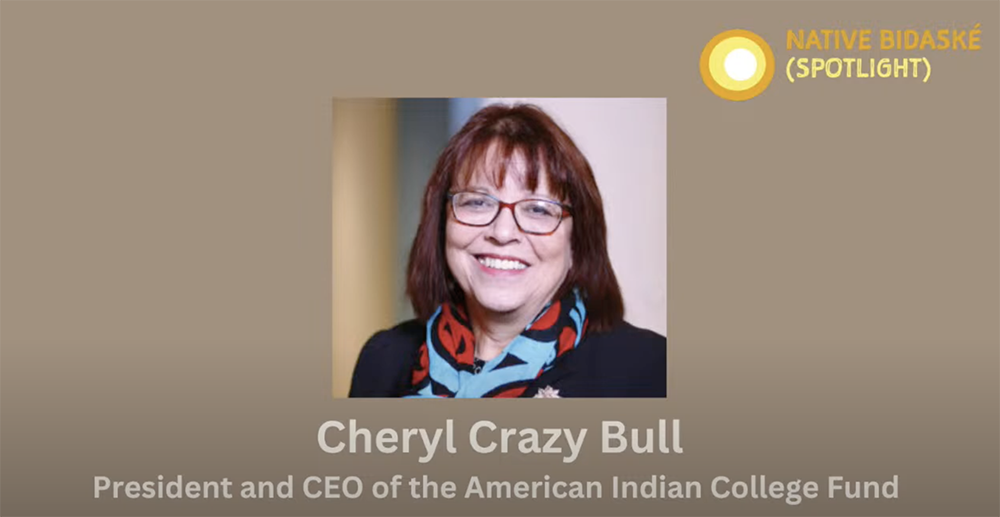
- Details
- By Neely Bardwell
Earlier this month, Native News Online’s publisher and editor Levi Rickert interviewed Dr. Cheryl Crazy Bull, the president of the American Indian College Fund for an episode of Native Bidaské.
The American Indian College Fund is the nation’s largest and highest rated affinity group providing scholarships to Native Americans, providing more scholarships to Native students than any other organization. Crazy Bull joined the Bidaské to discuss the Supreme Court’s ruling in the cases Students for Fair Admissions v. University of North Carolina and Students for Fair Admissions v. Harvard College on affirmative action.
“One of the things that the case made many of us who are in Native higher education realize is that there is not a lot of information about the impact of race conscious admissions on American Indian and Alaska Native students,” she told RIckert.
When it comes to defining Native identities, Crazy Bull explains that being Native is more than just a race, it’s a political identity because we belong to sovereign nations. When higher education institutions use race as part of their admissions criteria, a gray area is created that Native students don’t quite fit in.
“We call for institutions to both recognize our citizenship, recognize our membership as sovereign nations, and also recognize that there are inequities that are rooted in what our race interpretations are,” said Crazy Bull.
She believes it is the role of the institutions to ensure that they are creating a climate where all students feel like they belong in order to increase the participation of Indigenous students in higher education.
“‘What are you going to do as an institution already not serving Indigenous people? This is really an opportunity to examine that and the shift in how you might support Native students.”
Crazy Bull has a lifelong history of being an educator and a community activist, using the philosophy and traditions of Native people as the backbone of her activism.
Watch the Bidaské here.
More Stories Like This
Native News Weekly (August 25, 2024): D.C. BriefsNavajo Nation Mourns the Passing of Former Vice President Rex Lee Jim
Deb Haaland Earns Endorsement From Communications Workers of America Local 7076
University Soccer Standout Leads by Example
Two Native Americans Named to Democratic Congressional Campaign Committee's“Red to Blue” Program
Help us defend tribal sovereignty.
At Native News Online, our mission is rooted in telling the stories that strengthen sovereignty and uplift Indigenous voices — not just at year’s end, but every single day.
Because of your generosity last year, we were able to keep our reporters on the ground in tribal communities, at national gatherings and in the halls of Congress — covering the issues that matter most to Indian Country: sovereignty, culture, education, health and economic opportunity.
That support sustained us through a tough year in 2025. Now, as we look to the year ahead, we need your help right now to ensure warrior journalism remains strong — reporting that defends tribal sovereignty, amplifies Native truth, and holds power accountable.
 The stakes couldn't be higher. Your support keeps Native voices heard, Native stories told and Native sovereignty defended.
The stakes couldn't be higher. Your support keeps Native voices heard, Native stories told and Native sovereignty defended.
Stand with Warrior Journalism today.
Levi Rickert (Potawatomi), Editor & Publisher

